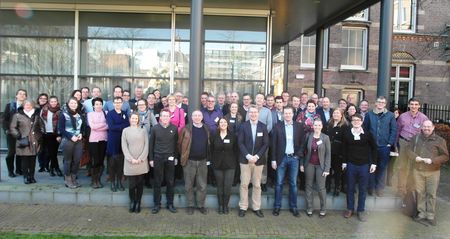CANCER-ID: Cancer treatment and monitoring through identification of circulating tumor cells and tumor related nucleic acids in blood
- CANCER-ID is a public-private partnership supported by Europe’s Innovative Medicines Initiative (IMI)
- University Medical Center Hamburg-Eppendorf, University of Twente, Bayer HealthCare and Menarini coordinate the international consortium
Blood-based biomarkers such as circulating tumor cells (CTCs), circulating free tumor DNA (cfDNA) and microRNAs (miRNAs) are potential indicators for the tumor burden of patients living with cancer. Derivation of these markers from blood may offer an additional invaluable tool for modern cancer therapy: apart from being of high importance when biopsies of the tumor are not accessible, blood-based tests may allow a close follow-up of disease markers offering a means to monitor the efficacy of treatment and potentially improve the choice of treatment options.
CANCER-ID is a newly formed European consortium funded by the Innovative Medicines Initiative (IMI) with currently 36 partners from 13 countries aiming at the establishment of standard protocols for and clinical validation of blood-based biomarkers. It brings together experts from academic and clinical research, innovative Small-to-Medium sized Enterprises (SMEs), diagnostics companies and the pharmaceutical industry thus providing a unique setting for establishing clinical utility of “liquid biopsies”. The contributions to the project of currently 8.2 million EUR by the industrial partners are complemented by funding from the IMI Joint Undertaking resulting in a total budget of EUR 16.7 million.
The academic leads of the CANCER-ID consortium are Prof. Klaus Pantel, Head of the Department of Tumor Biology at the University Medical Center Hamburg-Eppendorf, Germany, and Prof. Leon Terstappen, Head of the Department of Medical Cell Biophysics at the University of Twente, The Netherlands. Both are leaders in the field and have an impressive track record in both basic research and applied science including device development. The EFPIA lead companies of the CANCER-ID consortium are Bayer HealthCare and Silicon Biosystems, A Menarini Group Company.
Quotes:
“Blood-based analysis of tumor derived cells and nucleic acids offer a novel concept of liquid biopsies which allows to receive real-time information relevant to cancer diagnosis and therapy. The CANCER-ID project fills the substantial gap between basic research focused on novel methods for the detection and characterization of circulating tumor cells and nucleic acids and the development of robust validated assays required to bring the liquid biopsy concept into the clinic”, says Prof. Klaus Pantel from the University Medical Center Hamburg-Eppendorf.
“The time has come to join forces and determine the best path forward to guide therapy of cancer patients. It is great that we are now in a position to extend and expand our work from our EU FP7 program CTCTrap and determine utility of the technologies developed in this project for patients with Non-Small Cell Lung Cancer. The collaboration between small and large enterprises with a stake in this field, academic leaders and clinical investigators certainly sets the stage to truly make headway in this field”, says Prof. Leon Terstappen from the University of Twente.
“CANCER-ID is an excellent example of a project in which a public-private partnerships enables a collaborative research approach to come up with novel concepts in modern cancer therapy”, says Dr. Thomas Schlange from Global Biomarker Research at Bayer HealthCare Global Drug Discovery. “The consortium brings together a large experienced team of biomarker experts from all over Europe that extends far beyond the scope of traditional ‘one-on-one’ industry-academia collaborations.”
“We are excited to contribute to CANCER-ID”, says Giuseppe Giorgini, Chief Executive Officer at Silicon Biosystems, A Menarini Group Company. “We strongly believe the project will lead to a tremendous step forward in validating mature technologies and pave the way for their adoption in precision medicine for better patient treatment.”
About the Innovative Medicines Initiative (IMI)
The Innovative Medicines Initiative (IMI) is working to improve health by speeding up the development of, and patient access to, innovative medicines, particularly in areas where there is an unmet medical or social need. It does this by facilitating collaboration between the key players involved in healthcare research, including universities, the pharmaceutical and other industries, small and medium-sized enterprises (SMEs), patient organizations and medicines regulators.
IMI is a partnership between the European Union and the European pharmaceutical industry, represented by the European Federation of Pharmaceutical Industries and Associations (EFPIA). Through the IMI 2 programme, IMI has a budget of €3.3 billion for the period 2014-2024. Half of this comes from the EU’s research and innovation programme, Horizon 2020. The other half comes from large companies, mostly from the pharmaceutical sector; these do not receive any EU funding, but contribute to the projects ‘in kind’, for example by donating their researchers’ time or providing access to research facilities or resources.
More info: www.imi.europa.eu
The project is diveded into five work packages, reflecting the ![]() work plan and research focus of CANCER-ID.
work plan and research focus of CANCER-ID.
The ![]() CANCER-ID Consortium consists of 36 partners:
CANCER-ID Consortium consists of 36 partners:
Academia
- University Hospital Hamburg-Eppendorf
- University of Twente
- University of Manchester
- Institut Gustave Roussy
- University of Groningen
- University Hospital Düsseldorf
- Istituto Oncologico Veneto
- University of Graz
- University of Athens
- University of Montpellier
- University of Cambridge
- Max-Planck Institute for Molecular Genetics
- University of Turin
- Charité Berlin
- Oslo University Hospital
- German Cancer Research Center
- Institut Curie
- European Organisation for Research and Treatment of Cancer
- Integrated Biobank of Luxembourg/Luxembourg Institute of Health







